#you can do that in a narrative without being that direct?
Text
something that is very interesting rereading early MTMTE is that the comic is actually very much written with the assumption a ton of its readership are specifically pre-existing IDW comics readers, which can sometimes be difficult to remember because of the fact that a lot of people wound up coming onboard to MTMTE from outside the fandom in the end and now it has a reputation as an entry point as a result. this manifests in a couple ways throughout the first couple major arcs. one obvious one is that the Overlord stuff functionally makes it a sequel of sorts to Last Stand of the Wreckers, at a time no direct sequel was planned. but my favourite is that there's a kind of narrative trick the comic pulls with the leadup to the payoff Remain in Light gives us for Magnus.
the Magnus we get in early MTMTE is not the Magnus we get in earlier IDW comics. he's very exaggerated; where phase one Magnus is a by-the-books stickler for not so much as bending rules and someone we see struggling to maintain that sense of moral uprightness in the face of the war and the people around him being far less dedicated to staying on the straight and narrow like him, it's completely turned up to eleven in early MTMTE. phase one Magnus would not be doing endless doorframe audits, or throwing people in the literal brig for crooked badges. but this doesn't necessarily register as a change in character so much as a change in genre. MTMTE is also a dramedy with heavy emphasis on the comedy side of that in a way no other IDW comic is, and the shift in Magnus' characterisation therefore feels like 'well in THIS genre, that's what that archetype is like', rather than a diagetic shift in character. even if you come to MTMTE straight off those prior comics, it is very much a 'roll with the genre shift' thing rather than a 'hm. Magnus is acting… weird' thing. you let it go.
there are a couple indications this might not be the case early on. Rodimus especially seems to be under the impression that Magnus is acting uptight even for him, with his insistence on waving it off like 'he needs to relax, Swerve can you get him to chill on Hedonia because my guy is REAL stressed' and the like. (this makes sense- Rodimus is the person on the ship who has actually been directly interacting with Magnus regularly pre-MTMTE.) but it's not super obvious and not heavily emphasised.
which makes the eventual post-Overlord and RiL reveal, which is that Magnus has in fact been acting weird because he's having a breakdown that has largely gone unremarked upon by his shipmates, really really good. Magnus has not been doing doorframe audits because he's the comically uptight second in command acting as straight man for genre purposes; Magnus has been sending Rodimus a million memos a day and losing his shit over nothing because as someone whose entire identity as 'Magnus' is rooted in a wartime role he escaped into, he's been having an existential crisis now the war is over and he has no purpose and doesn't know what to do because he never expected to have to play that part in peacetime. the entire time the genre shift was somewhat obfuscating the fact this characterisation was a thing that is in-universe relevant, which also then reflects back on the fact Rodimus is like. hm. probably should have noticed that, now I feel like an asshole for not realising. (the scene where he and Rung discuss those unread memos, post-Overlord.)
it's a small thing, but it's a really effective misdirect for the payoff Magnus gets in RiL that reads a hell of a lot more clearly on reread and rewards that chance to revisit the early issues with that knowledge. of course that wasn't just a gag, of course he's actually slowly losing his shit slightly, he cannot go five seconds without making it clear he is Stressed As Hell. but until you get to that actual reveal, there's just enough room for the comic to let a reader assume it's, you know, we're in a comedy now, we need a hilarious straight man, and Magnus is it. it's great! all the stuff MTMTE pulls to simultaneously obfuscate the Magnus/Minimus reveal while also making it feel completely reasonable on reread is great. really good use of reader bias there.
76 notes
·
View notes
Text
The thing about comparing Kipperlilly's grudge to hating DEI and affirmative action is that those things are exactly what she's advocating for. The Bad Kids are not receiving accommodation for anything - and in fact Aguefort seems like the type to despise things like accommodations and would tell disabled people to pick themselves up by their bootstraps, but I digress -rather, they have direct connections to massive save-the-world plots three years in a row now that puts them way ahead of everyone else. Though they put in hard work, that doesn't change the fact that no one else working as hard as they can will ever equal being told to go stop a god from coming back and coincidentally your dad (a) worked directly with that dead god's primary agent in the past and (b) is now a super cool angel secret agent who will directly assist you in the task. Oh, and also, your teammate's parents are the dead god's primary mortal agents. And also they kidnapped your other teammate's dad because he's a powerful demon lord so now she's involved too. And you all happen to end up on Leviathan, where Fabian is an instant celebrity who immediately gets a cult worshiping the planks he walks on because they all work for his rich undead infernal dad.
The issue is that people keep mapping it to the real world and seeing "tragic backstory" like it would be IRL, which is a mistake. It's not a disability. They don't go to normal school to become accountants or NASA engineers, they are there to be doing exactly that shit that their backstories rope them into. Like, this isn't Buffy, they aren't saving the world incidentally, this is school for saving the world to pursue a career in saving the world. Spyre functions so differently from IRL that everyone is dramatically failing to comprehend the actual situation everyone is in.
And the thing about hating affirmative action is that it presumes someone only got into whatever not because they have skill, but because of their race or something like that. That's manifestly different from what's going on here. Kipperlilly has no doubt the Bad Kids are incredibly powerful and skilled - but their backstories gave them opportunities to use that power and skill that no one else will ever have regardless of effort or even luck. The Bad Kids can't go five seconds without tripping over the revelation that the BBEG for the year is one of their second cousins. That just doesn't happen to other people, period. The world revolves around the BK's in ways it will never revolve around anyone else so the Bad Kids will always get the massive adventures to save the world and be the top of their class because they're personally connected to the narrative.
Remember, Brennan has confirmed that other AA students do not do shit like that. They do exactly the sort of missions you'd expect them to - go in dungeon, fight monsters, come back. It's not "uh, the Rat Grinders should have just gone out and saved the world too", that's not how it works. AA students are not usually expected to, their rat grinding is just a more tedious and efficient version of what they would be doing otherwise. The BK's don't get involved with these plots simply because they're the most heroic heroes ever who seek wrongs to right, they do it because every single time everyone but Gorgug (who is for the most part absent major narrative stakes) was born someone that would get those in's, feats reproducible by no one else.
"Ah, but the Seven-"
The Seven prove the tragedy of it. Because Kipperlilly is right, but she's also wrong. The brilliance of BLeeM this season is that he's crafted a narrative inseparable from the meta of how the game works. In a very real way this is like the Dungeons & Dragons versions of Tron. The fact that it's a series of fictional TTRPG sessions is essential to the universe and it's story, in a Twin Peaks-ian way.
Because, see, it's not actually, technically magical trauma that gives out those narrative advantages. Magical trauma is just the most obviously visible side-effect. What the issue actually is is that, as everyone has noted over and over again, the Rat Grinders are NPCs, and it is therefore impossible for the world to ever bend itself around them the way it does for the PCs. Except, most are just saying that as a funny haha joke.
No, like, literally, that's the issue. They will always be in the shadow of the handful of people that the people constructing their world, their timeline, their very existence, has decided matter. They are doomed by narrative causality to be "boring". And I'm going to take a moment to say here, isn't it crazy no one is talking about this when we just got done with Neverafter which was all about this exact thing????? Like, literally the BBEG was the Authors. That is the situation here, more or less.
Anyway, there will never be a demon attacking that due to a curse is only vulnerable to hot licks from Ruben's guitar passed down from the first gnomish rocker. Mary Ann will never be the prophesized liberator of kobolds enslaved in dragon dens. Ivy will never find out her father was secretly a super-soldier for the Council of Chosen who before he was assassinated left her notes detailing a sinister plot within the government of Solace.
People keep having a hard time with this because it intuitively doesn't feel right to ever classify something like losing a father in any context to have some kind of bright side. But if you take nothing else away from this post, let it be this: Adventuring as it's done in Spyre is not something done in the real world. Adventuring is something everyone chose to go to AA to learn and put into practice as their long-term career. And in that, absolutely these things give the PCs a completely one hundred percent insurmountable leg-up on the thing they're all in competition for.
And it being completely insurmountable in that way further goes to show the difference between hating that situation and hating affirmative action. Even AA is not a guarantee that a specific member of the majority will lose out on something and a specific member of the minority will get it instead. As soon as the character sheets were rolled everyone else at Aguefort may as well have just gone home and started studying to be accountants because the main characters had been chosen. Or they could keep going and hope they get a spin-off, I guess.
But Kipperlilly does keep trying, for she doesn't really comprehend the true eldritch horror beyond her existence shackled to the bits of a bunch of comedians, and her solution is to adjust for those unfair advantages.
Which is affirmative action.
How is that not obvious.
46 notes
·
View notes
Text
i think one thing that's always been interesting to me is that people really believe/take for granted that the federation's goal is the islanders' happiness, when we really don't have any way of knowing if that's the truth. cucurucho says it a lot, claiming to care about islanders' happiness above all else, and it's been scattered throughout some federation lore (as well as being hinted at with the reset cinematics), but that doesn't mean it's actually true-- it could still be a smokescreen of what they really want. which, imo, is not happiness.
if it's all one big experiment, supposedly one of many, the idea that this one is the one that involves seeing what happens when islanders are happy is not a provable thing still, nor is it clear what that actually means to the federation. does happiness mean the islanders are content to remain on the island? does happiness mean building relationships and connecting with others? does happiness mean self-fulfillment (something deeply immeasurable)? it's not clear what it means to the federation, nor if that is their true goal. it could be that that has nothing to do with their goal, and is a complete misdirect. it could be that cucurucho's prime directive is the islanders' happiness (not that it's very good at that), but that's meant as a tactic to stymie islander curiosity/resistance. it could be any number of things.
and i think viewing it from a more meta lens of "we cannot tell what is or is not the truth; not only are all character povs biased but so is the larger narrative presented to us." i think comparing this framework to something like the good place is helpful, in that when you assume that what you're presented with is the truth and don't look at the setting critically, you will miss the fact that things presented to you as fact by any kind of source (including the framework of the medium itself or the established setting) are suspect and should be examined further.
i can even put it in a smaller way; there are ways within a limited character pov to present things as directly happening when they are not, and these are ways that mcrp creators have utilized. playing out an event that did not actually happen, canonical hallucinations, dream sequences that are not explained as such, physical representations of metaphorical experiences, etc. etc. are ALL things that mcrp creators of done. tricking your audience is an incredibly interesting and at times vital part of mcrp. so if just one creator within their own pov can do it, why can't the whole narrative? why can't you be convinced you're in a different genre, why can't you be convinced that the physical location your characters are placed in is someplace that isn't?
all this to say, i think a major issue in terms of analyzing media like this is allowing yourself to go along with assumptions without thinking about why you're falling so easily into them as truth. making all of your lore assumptions based off the notion that it is objective fact that the federation cares about and has the goal of islanders' happiness means you are going to miss details and fixate on others without looking at the full scope of possibilities. which i think was a serious issue during the height of investigation/mystery stuff-- people fell into the trap of "i KNOW this to be true" without considering the man behind the curtain. sure, cellbit found documents indicating that the federation was founded on isla quesadilla-- considering who sent him on the trail of said documents, who's to say that that's the truth?
i think bagi is a particularly interesting investigator when it comes to this kind of thing-- she's VERY good at holding onto a lot of different possibilites in her mind, even going so far as to act on a lot of them at once, and that means she doesn't take anything for granted. having all of the data in front of you, without attempting to skew it to a theory you already have in mind (which i admit is very difficult to do! humans are biased and are geared towards pattern recognition), is an important skill when it comes to any kind of data analysis or investigation.
anyway idk where i was going with this i just started thinking about like. what is involved in good theorizing and how focusing on something you believe to be fact can lead you in the wrong direction, and i think the idea of the islander's happiness as the federation's main goal is one of those very fraught assumptions people get caught up in.
39 notes
·
View notes
Text
There's something so real about a lot of these early NMTD videos that even the best of other webseries never quite captured. Maybe it's the range of styles between 4-5 different vloggers (so far we've had Beatrice, Ursula, Benedick, Hero, and Dogberry/Verges). Bea is engaging, snarky, and direct, confidently ready to film herself. Hero is cheerfully sweet and feels wonderfully tuned to the camera and her own style. Ben is a bit awkward and strange and so ready to have a relationship with viewers, without much experience to back it up. Ursula is predominantly behind the camera and seeks to film art as she sees it. Dogberry and Verges have a crappy camera and no sense for filming or vlogging, but so much passion.
The episodes leading up to PROJECT II - ONE SHOT all feel remarkably distinct and unrelated. Yes, these characters are clearly interconnected (seen in VOX POPS through Ursula's storytelling, but also with the linked scenes in "Football Antics" and the Watch's video), but their vlogs are just... different and unrelated. And best of all, they have such different filming, editing, and storytelling styles. They really feel like they're coming from different characters. And there's no clear narrative! What's the story? Is it just a bunch of vlogs from some high school kids circa 2014?
I love ONE SHOT partly because of how it's shot and all (it's great!!), but also... it's just such a COOL way to show off how so many of these threads do fit together. There's an almost-effortless naturalness to how ONE SHOT shows these teens being silly, arguing, and having fun. It's lovely. It's different. It feels so real, so unscripted, so natural.
At this stage, it's so easy to question what Nothing Much to Do is even about. If you don't know the plot of Much Ado About Nothing, I don't think there's any easy way to guess how this story is playing out. And I love that the naturalness of the different filming styles can really make it seem like, no, there's no overarching narrative, there are just a bunch of kids making silly Youtube videos (as was decently common at the time) and having fun online and sharing about their lives. Drama? What drama? (We're in a Shakespeare comedy, aren't we??)
22 notes
·
View notes
Photo
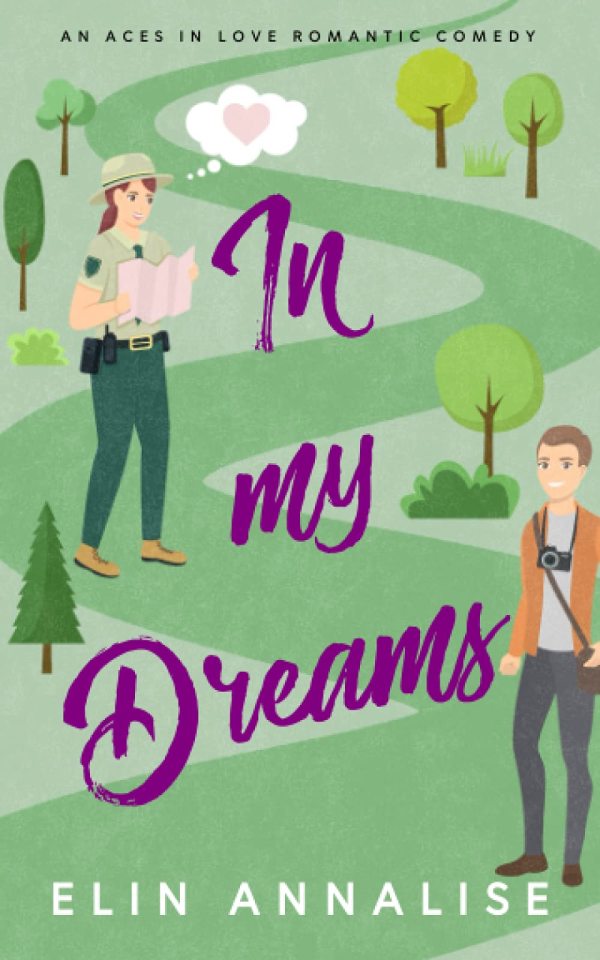
2023 reads // twitter thread
In My Dreams
romcom novella
when the nature reserve she works at goes into lockdown due to dangerous fugitives in the area, an ace woman is stuck for two weeks with the childhood friend she was in love with as a teenager
#aroaessidhe 2023 reads#this is....#the writing is not great. pacing is weird. it’s kind of random#also as with the other book I’ve read by this author sudden dramatic danger???#i feel like there could have been another reason to lockdown a park for 2 weeks other than. terrorists are in the area#it's quite ace 101 / revolving around asexuality / a bit..alloromantic#or like. the people around her are aphobic in ways that feel like they were just there as an excuse for the mc to refute it…..there’s ways y#you can do that in a narrative without being that direct?#the way there’s this other woman who she thinks he’s gonna be into and her only personality seems to be ‘wears makeup and is obvious about t#trying to seduce him”#also the male mc is kinda misogynistic#'he's never known a woman to take less than 15 minutes to shower" ????#also his mum has a heart attack and he leaves in the middle of the night! she assumes hes broken up w her ! why is this drama!#i cannot name a single good thing about the love interest lmao#am interested in reading the f/f one in this series but. if it's ever on scribd i guess lol
6 notes
·
View notes
Text
don't you love when you're like, okay now I'm going to leave this sorrow in the old year so I don't turn into a crotchety bitter person over it, and then you walk on feeling all refreshed and bright no longer carrying it on your shoulders, but then the sorrow wanders after you like a child who was lost in the supermarket weeping its eyes out and it says to you where did you GO I was lost! I was lost and I missed you!!! and you can only sigh and take it by its hand and say to it very well. here's your seat. I'm sorry I left you behind, I promise it was with the best of intentions, but I want to do my best by you, so let's sit together and try to figure out what you're saying to me.
#thinking out loud#i'm truly like. ok i'm mostly fine i'm a little bit going through it because it's harshest month of winter and it's always weird this month#but i just think it's so funny that i have to be like OH you don't suddenly stop....hurting over something because you decided to!#if you were missing someone who was important to you two months ago by golly you probably still will two months from then!!#weird how that be! anyway#it's funny to me because it's like the opposite of object impermanence#i used to think i was all heart no head and that there's a part of me that went hard in the opposite direction to counteract that#but i am still as much as heart as i ever was except now i have my logical side going yip yip girl we gotta go!!! let's go!!!#and the heart is like holding up a shakey hand going oh lads you go on without me...i just need to catch my breath for like....15 years#anyway anyway. the narrative is indeed kind but that doesn't mean that it doesn't sting sometimes#but! we can do the best that we can and take our troubles by their hands and learn what we can from them and it will all be okay in the end#(i hope this post isn't too complainy or miserable. i may take it down later but i feel the need to say it somewhere.)#regardless of that. happy Friday my friends I love you all dearly bless you for being near me <3 <3
184 notes
·
View notes
Note
Could you maybe write a blurb or fic where Spencer just goes completely feral over how loud reader is in bed 🥵
a/n: im almost certain this is not what you asked for but i got this plot idea and hjhhhhhhhdhf
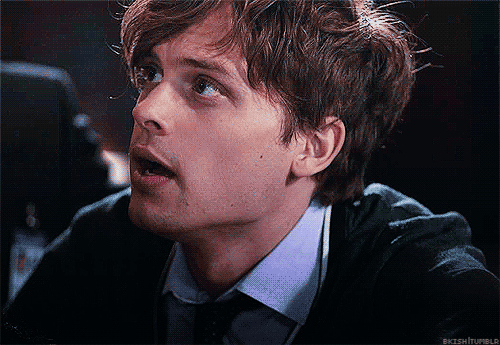
They say good couples share bad habits. This had become true in the six months you and Spencer had been together. The bad habit in question was being reported to the police for excessive noise by his really bitter neighbors.
Now, what kind of noise could a quiet FBI agent and a simple person, such as yourself, make, you may ask? Well, that would be the obnoxiously loud moans and cries that you used to let out during sex.
"Fuck, fuck!" you would have said more, but the fact that your knees were touching your breasts as Spencer had you in a mating press had scrambled your brain beyond the skill to speak.
He himself could only smile at the fact that your moans had overpowered the sound of moist skin lapping together. He loved when you were so loud, nay, he loved when he fucked you so good you had no choice but to share it with the world.
You could feel his entire shaft bury itself within you, the sensation of his testicles against your ass just serving as confirmation of the fact.
His member was tinted a vague white, the thing with Spencer is that you never understood where he got such stamina from. The speed of his thrusts were proportional to the decibels of your whimpers, the louder you yelled, the more eager he used to get.
Smack! A loud banging noise distracted you a little, causing you to shut up for a second. Spencer, however, did not give in to the sound of the door being pounded, eyes still on your flushed face, cock still hitting the deepest ends of your pussy.
"Can you please shut the fuck up?!" a stranger yelled from outside his apartment door "Come on man, shut your whore up! it's been two hours!"
You brought your hands to your mouth, trying to fight back the noises that you were making out of embarrassment.
"No, no." Spencer lowered his speed to talk "What are you doing? I need to hear you."
"Your neighbors can hear everything!" you barely whispered.
"They should be thankful." he reached for your wrists to open the path for your mouth again, pressing a quick kiss to your lips "I bet he touches himself to your moans." he bucked his hips forward slowly, and a whimper escaped you "Yeah, those delicious little sounds you make. Takes a simple exhale to have me rock hard, couldn't blame him if the way you screamed made him cum in his pants."
His narrative had gotten so filthy, so unlike him, a facade that you only saw whenever he knew he had you at his mercy, the sort of information he could only get by the sounds of pleasure he loved so much. Without your permission, your walks ended up clenching around him, aching for his previous pace to take over again.
"Oh, you like that, don't you?" he smiled in your direction, his forehead touching yours "I would normally be jealous, but you feel so good I can barely think straight."
"Spencer..." you muttered in a begging tone, a much lower one compared to what he liked.
"What was that?" his hips began to pick up their pace once again "Speak up, baby, he can't hear you."
"Spencer!" your tone began to raise once more as the thrusts became faster.
"That's good." he praised "Let's show him what my little whore can do."
#spencer reid x reader smut#spencer reid x reader#spencer reid x you#spencer reid#spencer reid smut#criminal minds#criminal minds smut
3K notes
·
View notes
Text


Fearless Social Confidence: Strategies to Live Without Fear, Speak Without Insecurity, Beat Social Anxiety, and Stop Caring What Others Think - Patrick King book notes
Socially confident people:
expect to be accepted. When they meet strangers, they expect to make a good impression. They never approach situations thinking, “What if they don’t like me?” Instead they think, “I hope I like them.”
evaluate themselves positively. Socially confident people are encouraging, positive, and accepting of themselves. They give themselves leeway not to be perfect and don’t beat themselves up too harshly when they are not.
feel comfortable around superiors. Socially confident people feel comfortable because they don’t feel threatened, or that their flaws and vulnerabilities will be highlighted by the other person’s qualities.
With a lack of social confidence, you are usually choosing the thought that is cruelest to yourself.
when navy SEALs recognize that they are feeling overwhelmed, they regain control by focusing on their breath—breathing in for four seconds, holding for four seconds, and then out for four seconds, and repeating until you can feel your heart rate slow down and normalize.
Core beliefs:
Steps in a thought diary entry can be arranged in the easy-to-remember A-C-B format—
Activating Event. Note down the event/ situation. This is simply the origin point of your emotional change. It’s whatever caused your emotional status to change from calm to agitation (a memory, a song, etc).
Consequences. In this step you identify the specific emotions and sensations that arose. These could be simple feeling words— “anxious,” “unhappy,” “sickened,” “panicky,” “melancholy,” “confused,” and so forth.
Beliefs. This is where the action begins. How do you link the activating event with the consequences? What unconscious narrative or story about yourself was told to achieve the consequence? (“What was I thinking?” “What was going through my head when this happened?” “What’s wrong with that?”“What does this all mean?” “What does it reveal about me?”)
Now you’ve gotten to the bottom of your situation and figured out what your core beliefs are.
The first step is writing down one of the core beliefs you’ve just uncovered. Ask yourself what experiences you’ve had that prove your core belief wasn’t always true. Generate as many experiences as you can and be very specific about what happened.
Write down the core belief you’re examining. Think of ways that you can put that belief to the test. These are actual tasks that you can perform. Then, write down what you expect or predict will happen after conducting these tasks if your core belief was true. Perform the tasks. Write down what really happened after you completed your task. Compare and contrast your predictions with what actually happened. Finally, document what you learned from the task and come up with a new, more reasonable core belief that goes in line with your discoveries.
Bushman’s results imply that sometimes the best course of action after being provoked to anger is to just sit quietly and let it pass.
There’s a direct link between social anxiety and negativity. A 2016 Australian research study showed that “elevated social anxiety vulnerability is characterized only by facilitated attentional engagement with socially negative information.” Obsessing over negative details—including by constantly talking about one’s problems—only reinforces one’s social fears and does nothing to inspire real confidence in a social setting.
Personalization is the mother of guilt. In the cognitive distortion of personalizing, you feel responsible for events that cannot conceivably be your fault. While it is admirable to take responsibility for your actions, there are things completely out of your control: the subway schedule, other people’s actions, and a million day-to-day factors.
Common cues of overgeneralization are “always” and “never.” When starting a sentence or a thought with “always” or “never,” consider whether you have the experience or evidence to back up the statement.
Other people aren't only what they are showing to the world. Most people put on a good show. But do you really know what might be going on in their private life? Take comfort from the fact that while there will be many people who are better at certain things than you are, there are also most certainly things that you will be better at.
If you are self-conscious and worried that people will judge you if you say something stupid or “off,” there's an easy workaround to that. The best approach is simple preparation. Create answers to predictable questions and conversations. Run that mental videotape in your mind about your past 10, 20, or 30 social conversations. I guarantee they are not all that different from each other.
Figure out the general questions that people will ask and the topics that will come up in normal conversation and be prepared with story-answers. For example, How was your weekend? What are you doing this weekend? How was your day? What do you do for work?
How can we ease ourselves into social confidence little by little?
List the social situations you avoid. Ask yourself what kinds of gatherings or circumstances you steer clear of and write them all down in a list. Your list should include both physical situations—parties, family gatherings, work presentations, and so forth—and personal experiences that you don’t want to face.
Give each situation a SUDS level from 0 to 100.
Plan your goals.
Build your goal stepladder. You’ve planned a goal and have decided to start work. Remember, situational exposure is a bit-by-bit process.
#powerful woman#c suite#ceo aesthetic#personal growth#strong women#productivity#that girl#getting your life together#balance#Book#social#social anxiety#confidence#speaking
2K notes
·
View notes
Text
just musing about gale and his parents:
we only have a handful of conversations where he mentions his parents and when he does, it's usually only his mother, morena dekarios.
his mother is mentioned at several points in the game. during a custom protag playthrough, he mentions her in a datamined conversation that appears to be bugged/broken:


and he mentions her at the end of the game as well when he proposes to the player:

i was also able to find another mention in a banter with karlach that usually happens for me shortly after recruiting her:

from gale's origin, this aspect is explored even more deeply:
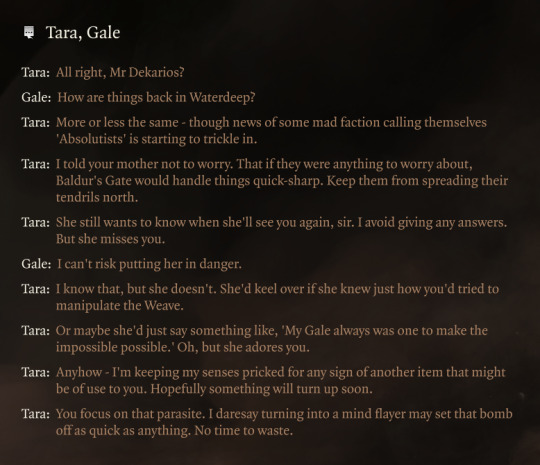
there's more, of course, and it very clearly shows that the bond he shares with his mother is a deep and loving one from both sides. it's also very interesting that he is called dekarios after his mother and not--even though naming conventions could certainly vary even in waterdeep--after his father.
who he doesn't mention at all.
the only time we do get a vague mention is during a conversation with the protag after saving mirkon from the harpies:
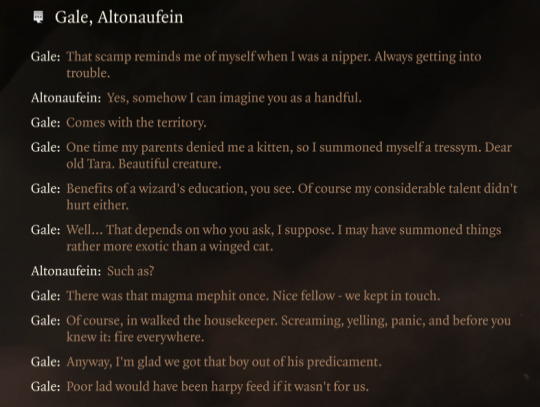
after that, i haven't been able to find any reference, indirect or direct, to gale's father in the game.
so, here we enter theory territory:
i feel that, from a narrative point of view, in keeping with what i think gale's themes are, gale's father may have abandoned gale and his mother when gale was still young.
gale's character is rife with what might be interpreted as abandonment issue and it makes sense to me at least that those weave through his life up until the point where the protag meets him in the game.
another theme with gale is that he appears to have a lot of female figures in this life, who all had a profound impact on him, whether that impact is positive or negative: morena, tara, and yes, mystra.
it feels like to me that he had no father figure--and i use that term a bit more loosely here--until later in his life with elminster. this is already hinted at in a game with a custom protag, but all the more solidified in a gale origin playthrough:
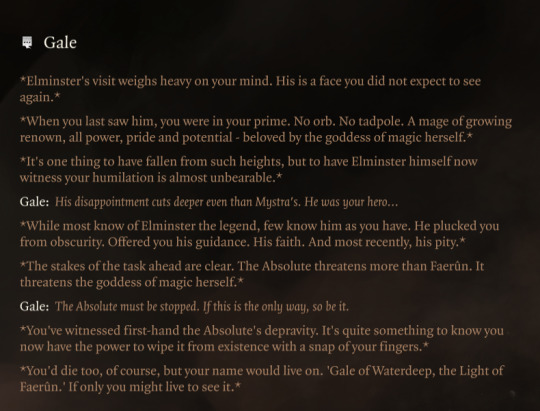
i think without directing telling you, the game does allow you to sort of guess at that part of his background in this way, and understand why gale is as he is as a consequence. you can also understand why he acts as he does with elminster. seeking his approval. yearning for it. being extremely hurt by elminster having to see him like this when mystra sends him to gale to deliver her... instructions. this almost pointed absence of a mention of his father in all his comments (and tara's too, now that i think about it) when it comes to family is glaring to me.
being left, being abandoned, makes it much more understandable to me why he doesn't speak of him at all: if gale's father had died, it would make more sense to me that he would remark on it or share it in some way or another. it might have come up in a banter with wyll, perhaps, who is struggling with the expectations his own father had placed on him.
"he died when i was still very young." perhaps, or something along the lines of, "i barely remember him; he died when i was only a child.", etc etc etc.
YET if gale's father indeed abandoned his mother--who he holds in such high regard, and not to mention his own hurt--i can easily see and understand why he wouldn't waste a word on him.
anyhow yes, this is long and ramble-y, and i 100% might be reading too much into what may be a simple oversight, but it was interesting to me and i still see it as tying in with the theme of abandonment, even though we don't know the reasons for it in this particular case.
was it not wishing to deal with a child with magical talents he couldn't control yet? was it for another reason entirely?
#gale dekarios#gale of waterdeep#baldur's gate 3#bg3#bg3 meta#ch: gale dekarios#vg: baldur's gate 3#series: baldur's gate#bg3 spoilers#baldur's gate 3 spoilers#meta: mybg3
1K notes
·
View notes
Text
I hate the plastic surgery industry and how it preys on insecure women and then gives them false solutions like modifying their bodies to fit beauty standards instead of helping people understand they are beautiful and unique as they are and I hate the currently popular narrative that it's ignorant to be against plastic surgery like fillers and Botox because it's actually "empowering" to do what you want with your body even if it's an obvious direct reflection of toxic beauty standards that are also often rooted in oppression and discrimination
It's not coincidence what types of noses or face changes are popular and there's nothing empowering about 18 year olds getting cosmetic surgeries to look like a made up perfect version of themselves instead of being helped to embrace their bodies as they are and the faces and features they have
If it's fucked up for me to say everyone looks better without veneers and butt implants and Botox then I will happily be fucked up - everyone can do what they want but I will not support it or treat it like a kindness that it's becoming normalized and celebrated
593 notes
·
View notes
Text
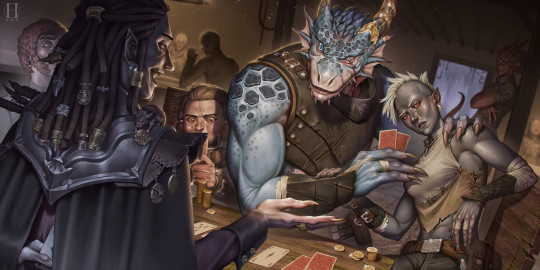
Dm Tip: Playing the Villain/ Guidelines for "Evil" Campaigns
I've never liked the idea of running an evil game, despite how often I've had people in my inbox asking how I'd go about it. I'm all about that zero-to-hero heroic fantasy not only because I'm a goodie twoshoes IRL but because the narrative-gameplay premise that d&d is built around falls apart if the party is a bunch of killhappy murder hobos. Not only would I get bored narrating such a game and indulging the sort of players who demands the freedom to kill and torture at will (I've had those before and they don't get invited back to my table), but the whole conceit of a party falls through when the obviously villainous player characters face their first real decision point and attempt to kill eachother because cooperation is a thing that goodguys do.
Then I realized I was going about it all wrong.
The problem was I had started out playing d&d with assholes, those "murder and torture" clowns who wanted to play grand-theft-auto in the worlds I'd created and ignore the story in favour of seeing how much unchallenged chaos they could create. They set my expectations for what an evil campaign was, and I spent the rest of my time developing as a dungeonmaster thinking " I Don't want any part of that"
But what would an evil campaign look like for my playgroup of emotionally healthy friends who understand character nuance? What would I need to change about the fundamental conceit of d&d adventures to refocus the game on the badguys while still following a similar enough narrative-gameplay premise to a hero game? How do we make that sort of game relatable? What sort of power/play fantasy can we indulge in without going off the deepend?
TLDR: In an evil campaign your players aren't playing the villains, they're the MINIONS, they're mooks, henchmen, goons, lackeys. They're the disposable underlings of uncaring overseers who have nothing but ill intent towards them and the world at large.
Where as in a hero game the party is given the freedom to challenge and overthrow corrupt systems, in an evil game the party is suck as part of that corrupt system, forced to bend and compromise and sacrifice in order to survive. The fantasy is one of escaping that corrupt system, of biding your time just long enough to find an opening, find the right leverage, then tossing a molitov behind you on the way out.
Fundamentally it's the fantasy of escaping a shitty job by bringing the whole company down and punching your asshole boss in the face for good measure.
Below the cut I'm going to get into more nuance about how to build these kinds of narratives, also feel free to check out my evil party tag for campaigns and adventures that fit with the theme.
Designing a campaign made to be played from the perspective of the badguys requires you to take a different angle on quest and narrative design. It’s not so simple as swapping out the traditionally good team for the traditionally bad team and vis versa, having your party cut through a dungeon filled with against angel worshiping holyfolk in place of demon worshipping cultists etc.
Instead, the primary villain of the first arc of the campaign should be your party’s boss. Not their direct overseer mind you, more CEO compared to the middle managers your party will be dealing with for the first leg of their journey. We should know a bit about that boss villain’s goals and a few hints at their motivation, enough for the party to understand that their actions are directly contributing to that inevitable doom.
“Gee, everyone knows lord Heldred swore revenge after being banished from the king’s council for dabbling in dark magic. I don’t know WHY he has us searching for these buried ancient tablets, but I bet it’s not good”
Next, you need a manager, someone who’s a part of the evil organization that the party directly interfaces with. The manager should have something over the party, whether it be threats of force, blackmail, economic dependency… anything that keeps the antiheroes on the manager’s leash. Whether you make your manager an obvious asshole or manipulative charmer, its important to maintain this power imbalance: The party arn’t going to be rewarded when the boss-villain’s plan goes off, the manager is, but the manager’s usefulness to the boss-villain is contingent on the work they’re getting the party to do. This tension puts us on a collison course to our first big narrative beat: do the party get tired of the manager’s abuse and run away? Do they kill the manager and get the attention of the upper ranks of the villainous organization? Do they work really hard at their jobs despite the obvious warning signs and outlive their usefulness? Do they upstage their manager and end up getting promoted, becoming rivals for the boss-villain’s favor?
Building this tension up and then seeing how it breaks makes for a great first arc, as it lets your party determine among themselves when enough is enough, and set their goals for what bettering the situation looks like.
As for designing those adventures, you’ll doubtlessly realize that since the party arn’t playing heroes you’ll need to change how the setup, conflict, and payoff work. They’re still protagonists, we want them to succeed after all, but we want to hammer home that they’re doing bad things without expecting them to jump directly to warcrimes.
Up to no good: The basic building block of any evil campaign, our party need to do something skullduggerous without alerting the authorities. This of course is going to be easier said than done, especially when the task spins out of control or proves far more daunting than first expected. The best the party can hope for is to make a distraction and then escape in the chaos, but it will very likely end with them being pursued in some manner (bounties, hunters, vengeful npcs and the like). Use this setup early in a campaign so you have an external force gunning for your party during the remainder of their adventures.
Dog eat dog: It’s sort of cheating to excuse your party’s villainous actions by having them go up against another villain who happens to be worse than they are. The trick is that we’re not going after this secondary group of outlaws because they’re bad, we’re doing it because they’ve either got something the boss wants, or they’re edging in on the boss’s turf. This sort of plotline sees the party disrupting or taking advantage of a rival’s operation, then taking over that operation and risking becoming just as villainous as that rival happened to be. This can also be combined with an “Up to no good” plot where both groups of miscreants need to step carefully without alerting an outside threat.
The lesser evil: This kind of plot sees your party sent out to deal with an antagonistic force that’s a threat not only to the boss’s plans but to everyone in general. In doing so they might end up fighting alongside some heroes, or accidentally doing good in the long run. This not only gives your party a taste of heroism, but gives them something in their back pocket that could be used to challenge the boss-villain in the future.
The double cross: In order to get what they want, the party need to “play along” with a traditional heroic narrative long enough to get their goal and then ditch. You have them play along specifically so they can get a taste of what life would be like if they weren't bastards, as well as to make friends with the NPCs inevitably going to betray. This is to make it hurt when you have the manager yank the leash and force the party to decide between finishing the job , or risk striking out on their own and playing hero in the short term while having just made a long term enemy. This is sort of plot is best used an adventure or two into the campaign, as the party will have already committed some villainous deeds that one good act can’t blot out.
Next, lets talk about the sort of scenarios you should be looking to avoid when writing an evil campaign:
Around the time I started playing d&d there was this trend of obtusely binary morality systems in videogames which claimed to offer choice but really only existed to let the player chose between the power fantasy of being traditionally virtuous or the power fantasy of being an edgy rebel. Early examples included:
Do you want to steal food from disaster victims? in Infamous
Do you as a space cop assault a reporter who’s being kind of annoying to you? in Mass Effect
Do you blow up an entire town of innocent people for the lols? in Fallout (no seriously check out hbomberguy’s teardowm on fallout 3’s morality system and how critics at the time ate it up)
I think these games, along with the generational backwash of 90s “edge” and 00s “grit” coloured a lot of people's expectations ( including mine) about what a "villain as protagonist" sort of narrative might look like. They're childish exaggerations, devoid of substance, made even worse by how blithely their narratives treat them.
Burn down an inn full of people is not a good quest objective for an evil party, because it forces the characters to reach cartoonish levels of villainy which dissociates them from their players. Force all the villagers into the inn so we can lock them inside and do our job uninterrupted lets the party be bad, but in a way that the players can see the reason behind it and stay synced up with their characters. The latter option also provides a great setup for when the party's actually monstrous overseer sets the inn on fire to get rid of any witnesses after the job is done. Now the party (and their players) are faced with a moral quandary, will they let themselves be accessories to a massacre or risk incurring their manager's wrath? Rather than jumping face first into cackling cruelty, these sorts of quandaries have them dance along the knife's edge between grim practicality and dangerous uncertainly; It brings the player and character closer together.
Finally, lets talk about ending the villain arc:
I don't think you can play a whole evil campaign. Both because the escalation required is narratively unsustainable, but also because the most interesting aspect of playing badguys is the breaking point. Just like heroes inevitably having doubts about whether or not they're doing the right thing, there's only so long that a group of antiheroes can go along KNOWING they're doing the wrong thing before they put their feet down and say "I'm out". I think you plan a evil campaign up until a specific "there's no coming back from this" storybeat, IE letting the Inn burn... whether or not the party allows it to happen, it's the lowest point the narrative will allow them to reach before they either fight back or allow themselves to be subsumed. If they rebel, you play out the rest of the arc dismantling the machine they helped to build, taking joy in its righteous destruction. If they keep going along, show them what they get for being cogs: inevitably betrayed, sacrificed, or used as canon fodder when the real heroes step in to do their jobs for them.
Art
#dm tip#dm tips#writing advice#evil party#drafting the adventure#dnd#d&d#dungeons and dragons#blades in the dark#ttprg#pathfinder
408 notes
·
View notes
Text
I got randomly recommended this video by YT and wrote a ginormous comment in response because I have no self control, apparently, so I thought I might as well also share my thoughts here in regard to whatever is going with THIS FUCKING SMILE
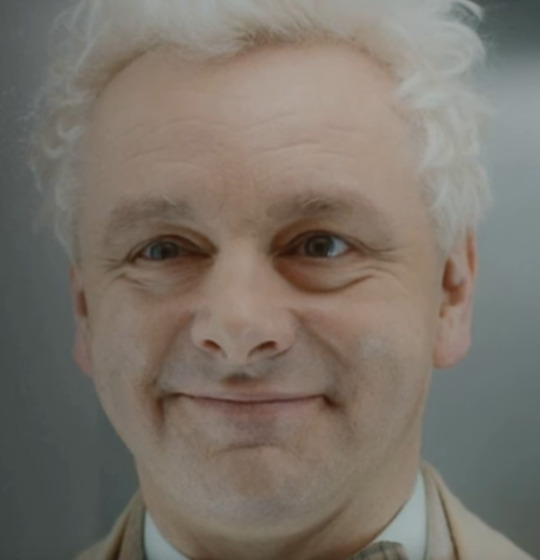
(under a cut to not clog y'alls dashboards)
(the first part of the comment here is a direct response to some of the ideas put forth in the video, it is very short so give it a quick watch for more context if you want)
Imo it's not necessary to look into overcomplicated theories that rely too much on off screen shenanigans to explain the smile, for how amusing the idea of them having swapped during the kiss is (like, the kind of stuff I won't want to be actually canon, but I'll be very happy to see explored in fan fics lol)
I think to fully explain that smile we have to take in consideration multiple factors:
This show is very purposeful in what it does and doesn't, well... show. That last shot is very long and I think the fact that Aziraphale's and Crowley's expressions in the aftermath of their disastrous break up is shown in such a manner tells us a LOT about the state of mind they might be at the start of S3, and the obstacles they'll have to face. Aziraphale doesn't immediately smile, rather he seems to look almost shell-shocked for most of the shot; it's clear (to me at least lol) that the quiet ride up the elevator is finally giving him some desperately needed time to fully digest everything that happened, because too much has happened in an extremely short amount of time, and we all know Aziraphale doesn't do well with speed lol.
But, for how much he can sometimes be a complete moron, he is smart, and all he needs are just those seconds of quiet to properly ponder on everything, on the choices made and the ramifications of said choices, and that's how we get to smile-- I'll delve into what I think Aziraphale is going through in his mind in more details later, because I also think it's necessary to focus a bit on Crowley's own expression, since the both of them are so intrinsically linked that the narrative cannot make sense without taking the both of them into account.
Crowley's expression is much more static and doesn't change the way Aziraphale's does; he looks profoundly tired in ways we've never seen him before. I don't think he's giving up on Aziraphale, and I fully believe the fact that he stood there and waited for Aziraphale to disappear in the elevator, the both of them sharing that last look, was a quiet message: He'll never give up on Aziraphale, he'll be there, waiting. But wait is all he can do for Aziraphale, now, because he can't follow where Aziraphale is going.
For how messy and full of heightened emotions the confession + kiss are, I think actually denying Aziraphale's request was a HUGE step forward for Crowley's character. He's never been able to deny Aziraphale, he always went back to him after every fight, and we all know how stupidly whipped for Aziraphale he is and how he'd empty the ocean with a spoon if Aziraphale asked him nicely-- But to actually put his foot down and say "no, I cannot do this for you" when asked to all but renounce the person he is now? Especially with how Aziraphale is all but begging him openly? That's a huge step, and something I think Crowley desperately needs to mature as a person (or, well, person-shaped being). We all love how Aziraphale has him wrapped around his little finger I'm sure, but we also all know that if they truly want to build a strong, healthy relationship they also both need to be able to keep their individuality and to put forth adequate boundaries about what they are willing to do for each other within reason.
Asking Crowley to come back to being an angel when he's made blatantly clear for six thousand bloody years how much he despises Heaven is not a 'within reason' request, innit?
So, yeah, for how heartbreaking the break-up was, in a sense Crowley needs it. They both do. They both need time apart to figure their own shit out, dismantle all those unhealthy habits they had to adopt in order to be with one another as safely as they possibly could while still 'employed', and then come back together with a clearer mind and a whole deal stronger than before, both as individuals and as a couple.
And I think how tired and downtrodden Crowley looks in that last shot is a precursor to this process, just as much as Aziraphale's smile is... So, let me get back to our favorite angel and what I personally think is going on with him.
I think to properly contextualize that smile we need to look at not just the happening of those infamous last fifteen minutes, but of S2 as a whole, and what Aziraphale does in it.
So, what is Aziraphale doing during S2?
At the start he seems to be more or less comfortably settled in his current life; he's as happy as ever doing what he's always done, enjoying humanity's creativity with his books and his music and his food and drinks, seemingly content to be puttering about in his bookshop (which is a stark contrast with Crowley's homelessness and his kinda adrift and depressed attitude). Of course then Jim!Gabriel throws a wrench right into that, but imo I think there was a lot more going on behind the facade of Aziraphale's well ingrained habits.
Sure, he still has all of his familiar comforts and his routine, but from the moment we see him interact with Crowley I saw a deep restlessness emerge in him: The panicked look he launches Crowley when Nina asks him about his 'naked man friend', the way he speaks with Crowley with all those 'our' he uses, the blatant way he keeps reaching over and touching Crowley-- To me that suggests that Aziraphale is clearly not as happy as he seems to be on a superficial glance. He clearly wants more with Crowley, wants to bring their relationship to the next step, but because the both of them are so deeply entrenched in their unhealthy coping mechanisms and habits and their inability to openly communicate it doesn't even occur to Aziraphale to just... You know. Take the first step, actually say something about it. So he just keeps throwing bait after bait in the water, hoping Crowley will bite and be the one taking the initiative as he's always done, finally allowing Aziraphale to accept said initiative, this time around.
Of course, we all see that Crowley doesn't take any first step, which is probably something deeply frustrating for Aziraphale at a subconscious level. That's how we get the ball; sure, on the face of it it was Aziraphale's way to make Nina and Maggie fall in love, but... Was it, really? Let's be real, for how entirely believable it is that Aziraphale makes up the lie about Nina and Maggie's love to cover for their miracle is, since we've seen him being anxious around other angels, I don't think for a second that had Aziraphale just stopped and spent three minutes thinking about it he wouldn't have found a way to convince Muriel that Nina and Maggie were, in fact, in love, especially with how 'green' Muriel is about humans.
I fully believe that Aziraphale is not properly thinking during S2, period. He's frustrated by his inability to bring his and Crowley's relationship to what he wants it to be, and that frustration and single-minded objective is utterly obfuscating his thought process. There are plenty of moments he seemed almost manic, imo, which I read as another sign about his 'impaired' (allow me the term) state of mind as of S2.
So, yes, the ball: On the face of it something to actually turn his lie to the Archangels into truth, but deeper down, perhaps almost unconsciously, I think Aziraphale sees the ball as a way to finally make him and Crowley happen. That fact that he's taking pointers about romance from human literature is blatant, and obviously he truly does believe the ball will be THE way to make love bloom.
If you stop and think about it, the ball scene is terrifying. These people are being manipulated to play the perfect background parts to make, what is in Aziraphale's mind, the height of romance atmosphere happen. The fact we get a juxtaposition with Nina's "what the F is going on, am I losing my mind???" rightful attitude underlines this. And I truly believe Aziraphale isn't exerting said manipulation with intent, but rather doing so subconsciously, because he's just so fixated on the idea of having finally the perfect set-up to have Crowley as he desires that he is influencing everything around him. After all, we all know they both have the tendency of making things happen the way they want simply by thinking that's how things are supposed to happen.
And again, he's so manic and giddy when he asks Crowley to dance, his ass is not LISTENING. He literally needed a brick thrown through a window to snap out of it.
So, in the present we have an Aziraphale who , in his own way, is trying to take the initiative, come out with plans. There is a moment that I think might have slipped under the radar of a lot of people but that's frightfully important about who Aziraphale is at this point in the story, and who he will need to become: "I have a plan," Aziraphale said to Crowley during the stare down with the demons outside of the bookshop after the ruined ball; Crowley didn't even seem to have registered that sentence at all, because his mind is already projected forward and going a mile a minute about what to do to keep both the humans and Aziraphale safe in this situation.
Crowley, who loves to swoop in and save Aziraphale, doing what he's always done to keep his angel safe, even to the detriment of their relationship with one another... And Aziraphale, who adores playing the part of the damsel in distress in turn, is actually telling Crowley that *he has a plan*.
That's not something to take lightly, methinks. That's very much just another sign that Aziraphale's individuality is struggling, trying to emerge through Aziraphale's anxiety and doubts and fears and deeply ingrained habits. Aziraphale's cognitive dissonance in regards to heaven, and his shaken faith in God are huge motivators of his actions, and in the grand scheme of things the scant few years he had away from under the oppressive thumb of heaven is nothing. It was barely any time at all in the face of the eternity of an immortal life spent under that oppression, and yet we are already seeing little glimpses of Aziraphale's rebellious side struggling to get fully free.
I think these little glimpses inform us at great lengths about the evolution Aziraphale's character will go through in S3, and greatly explains that strange smile right at the end; in my opinion that smile isn't the smile of someone who's trying to convince himself that he's ok, or realizing that Crowley loves him (he knew already, they both knew and have known for a long time, their inability to properly express those feelings was their downfall, but I don't think either of them has doubted even for a second when it comes to how much they love one another). In my opinion that smile is the smile of someone who is steeling himself for what he envisions in his future; equal parts old-sedated anxiety and yet determination to actually enact plans he's surely concocting in his brilliant little mind. That's the smile of someone who has just realized that not only they can, but that they need to do something, and you can damn well be sure they won't be sitting and twiddling their thumbs waiting to be saved, but they'll be the one saving themselves and everybody else along with 'em, this time.
Just as Crowley needs to actually spend some time define himself as himself, and not just in relation to Aziraphale, Aziraphale needs to spend some time shedding all those fears and doubts that are weighing him down, and emerge the other side someone much more self-assured and ready to do what he thinks is right without all the hesitations that have indirectly been strengthened by Crowley; in a way, by allowing Aziraphale an out with his 'temptations', Crowley had been feeding into those hesitations, and had been holding Aziraphale back from fully maturing, even if not done on purpose, obviously. Imo is very important for Aziraphale's character that he comes to realize that he doesn't need those excuses Crowley gifted him to keep doing what he thinks is right, that he actualizes his own morality properly, and enacts on it.
I don't have the faintest clue about what is going to happen in S3, but I do fully believe the above paragraph is what Aziraphale and Crowley's respective character arcs will focus on. And once they'll come back together they'll be the most power couple that has ever power coupl-ed, and the Metatron will have no clue about what is about to hit him >:)
#good omens#good omens 2#meta#I want Aziraphale to Fuck Shit Up in S3#you think I was joking with that comic I drew some time ago?#I am NOT!#LET AZIRAPHALE FUCK SHIT UP HE DESERVES IT
722 notes
·
View notes
Text
I'm surprised at the hate that Sokka's character arc from NATLA is receiving. To me, Sokka's development and characterization was one of the strongest adaptations the series made.
In the original ATLA, Sokka's character arc revolves around him unlearning his own misogyny. He makes pointedly sexist comments throughout the early episodes like "Leave it to a girl to screw things up!", "There's no way a bunch of girls took us down!", etc.
Sokka's comments have a strong narrative purpose: they give a platform for women in the show (Katara & Suki mostly) to refute his attitude. Katara emphasizes traditional "women's work" (cleaning, cooking, sewing, etc), which forces Sokka to confront its inherent value. Suki is able to prove to him that women can fight too and he learns to respect female warriors. It's a great character arc and it's well-executed.
It's also characterization that is in direct response to the culture and feminism of the 90s and early 00s. The representation of women in the media at that time was...oof. It was not great. One-dimensional love interests whose only purpose is being saved by the male protagonist, mostly. Female protagonists were not as common, and certainly not ones who were depicted as being able to fight, and certainly not in cartoons. Female protagonists in animation were almost exclusively princesses.
ATLA was progressive in this regard. Katara was a complex female character in a time when there were not a lot of them, in media in general but especially in animation and kid's shows. (I grew up in the 90s; there were no characters like Katara in animation on screen for me.) ATLA incorporated the zeitgeist directly into the story, which is why we have Sokka learning to overcome his sexism in his interactions with Strong Female Characters.
If you go back and watch the original cartoon now, Sokka's sexism feels a bit dated. It's a very 90s, Girl Power, "girls can fight too" style of social commentary. It doesn't match with the media landscape of today. We've got 20 years of media with female superheroes behind us. If your message is "girls can fight too!" the response for the most part is going to be "yes, we know that. And?"
So imagine you're adapting the original ATLA for a live-action remake. You want to keep Sokka's character arc intact, but you want to update it for the 2020s. So what do you do? You look at the conversations that are happening today.
The 90s were about "girls can do everything boys can do", but the 20s are over that. The conversation is more about gender: gender expression, gender roles, gender dynamics. What does is mean to be a woman? What does it mean to be a man?
Sokka's character arc in NATLA is focused on this question: What does it mean to be a man? At the beginning of the series, it's his identity as a warrior that defines him. He needs to be the warrior, the protector, the leader. He's constantly trying to reaffirm this part of his identity, and it's completely tied up in his perception of his value as a man. Instead of his interactions with Suki being about "how could girls possibly be warriors", it shifts to Sokka saying "I'm ALSO a warrior" and trying to justify that to Suki (and mostly himself).
His arc over the series is about him accepting other aspects of himself and relearning how to define his masculinity. He can still have value as man without being the greatest warrior. He can still have value as a man by using his skills as an engineer. He can still have value as a man by offering compassion and kindness to others, like the little girl with the doll & Yue in her final moments. Instead of rigidly defining himself by a specific set of gender roles & expectations, he learns how to define himself through his own strengths and qualities.
I know there are a lot of people who are upset at this change to Sokka's characterization, and the most common thing I see is that it results in changes to Katara's character and her anger in response to Sokka's comments. I think there are valid criticisms to be made about how the show handled the adaptation of Katara's character, but I won't go there with this. In terms of Sokka and his characterization, it was well-done and thematically consistent with the original. It's not an exact port, and it never needed to be. It's still a feminist arc that centres on unlearning harmful misogynistic worldviews, but the focus has shifted from external (roles of women) to internal (his role as a man). And his journey is one that people would benefit from seeing represented.
#atla#avatar the last airbender#natla#netflix avatar#atla meta#there are many criticisms to make about the adaptation but this just isn't one of them
294 notes
·
View notes
Note
Ideas for subverting popular character tropes? I've started a story and am having difficulty making my cast of characters unique. I'd love it if you had any fresh takes on tropes like the mentor, the sidekick, etc...
POPULAR CHARACTER TROPES AND PROMPTS TO SUBVERT THEM
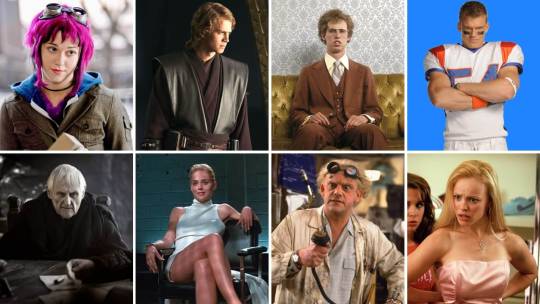
A character trope, sometimes called a character archetype, is a “recognizable element within a story or plot that defines or conveys information about a character. Character tropes can either define a character's entire role in a plot or the character's personality or motivations.” (source: arcstudiopro).
Many people bash “tropes,” but what you have to remember is that there is no such thing as a unique idea; everything has been done before, and the reason why tropes are so popular is because (a lot of time) they work!
It is totally possible to have a "normal" trope in your story without making it a cliché. However, if you’re looking to subvert these expectations, here’s a list of ideas I’ve come up with!
(This is me brainstorming on the fly to help get your gears turning, so I apologize if these aren’t fully fleshed out or if they’ve already been done before!)
1. THE CHOSEN ONE
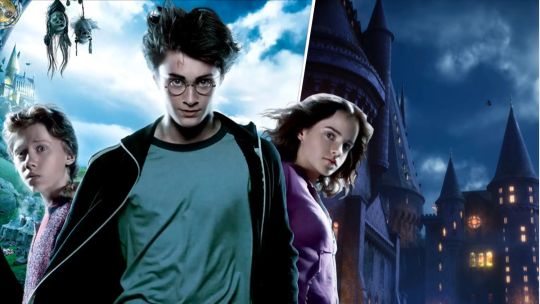
The “Chosen One” is a trope where “one character is framed as the inevitable hero or antihero of the story, as a result of destiny, unique gifts, and/or special lineage” (source: Wikipedia). The Chosen One is often depicted as naive or unwilling at the beginning, and has a progression of growth through the narrative when they “accept their destiny.”
Examples:
Luke Skywalker (Star Wars)
Harry Potter (Harry Potter)
Frodo (The Lord of the Rings)
Neo (The Matrix)
Subversions:
1. The protagonist who was believed to be the chosen one from the very beginning discovers that it was actually someone else the whole time and must come to terms with the realization that they no longer have this title that they’ve based their entire life (and perhaps personality) around. (Bonus points if the new Chosen One is someone they’re close to).
2. Every solstice, the “Holy Order” sends a Chosen One to defeat the monster that has been ravaging their town. None ever return. The protagonist is selected as the next Chosen One, only to find that being Chosen does not mean “Chosen to defeat the monster” but rather “Chosen as the sacrifice to appease the monster.” (Bonus points if the reason the Chosen Ones always die is because the “Holy Order” misguides them (gives them broken weapons/drugged food/faulty armor/directs them into traps/etc.)).
3. Having the Chosen Power comes with a price. After someone is Chosen, it is a death sentence. The protagonist must find a way to defeat the villain AND purge themself of the Chosen Power before it’s too late (Bonus points if the villain helps them purge the Chosen Power).
2. THE SIDEKICK

The sidekick is a friend and helper of the main protagonist. They are often depicted as a loyal comic relief character made to emphasize the hero’s greatness, and may be killed off to advance the hero’s journey.
Examples:
Robin (Batman)
Samwise Gamgee (The Lord of the Rings)
Chewbacca (Star Wars)
Pan (His Dark Materials)
Subversions:
1. The “sidekick” is actually the hero of the story; the narrator just has an inflated ego and believes themself to be the hero. Meanwhile, their “sidekick” is the one saving the world.
2. Sidekicks are often depicted as younger than the hero. Perhaps an older sidekick might do good to spice things up (Bonus points if it’s without turning them into the mentor trope).
3. The sidekick is a former hero who had to watch their own sidekick sacrifice themself, and was convinced to leave hiding by the current hero. (Bonus points if the sidekick dies in a poetic way that is a narrative foil to the way his own sidekick died, perhaps in a “I didn’t understand why they would sacrifice themself for me but now I get it”).
4. A ridiculously strong/powerful Mary Sue type character is the sidekick to a Normal Guy™ (Bonus points if they are incredibly content in this position).
5. The sidekick is not a willing sidekick; they were kidnapped by the hero because they have an object/bloodline/power/etc. that is essential to defeating the villain.
3. THE MENTOR
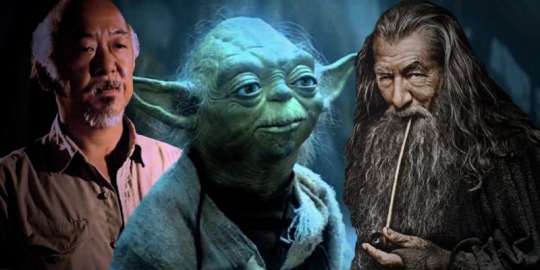
The Mentor is the protagonist’s teacher, who helps them transition from a “normal” person into a hero. The Mentor is often depicted as wise and virtuous, teaching the protagonist not only the ways of fighting or magic, but also the ways of good and evil. The mentor is often killed off to advance the hero’s character arc, due to the fact that they are sometimes seen as a parental figure.
Examples:
Dumbledore (Harry Potter)
Yoda (Star Wars)
Uncle Iroh (Avatar the Last Airbender)
Mr. Miyagi (Karate Kid)
Subversions:
1. The mentor is the narrator. After spending so much time training the Chosen One and raising them like their own child, they must hear news that they have been killed by the villain. While still grieving (or perhaps fueled by revenge), the mentor must venture out and defeat the villain themself.
2. Have the mentor be a woman! You would be shocked at how overwhelmingly male-dominated the “mentor” archetype is!
3. The mentor turns on the protagonist that they trained…not because the mentor has turned evil, but because the mentor believes that the protagonist has become a monster (à la Kung Fu Panda). (Bonus points if the mentor is actually right and the protagonist really has become a monster).
4. The bright-eyed Chosen One thinks the world of their mentor, only to realize through experiences with others that the mentor trained them horribly, and that the mentor only used their training to boost their renown—without expecting them to survive their fight with the villain. (Bonus points if the protagonist is an unreliable narrator, and we as the readers feel just as betrayed by the mentor because we, too, thought they were a great person).
5. The mentor is the former Chosen One, desperate for the current Chosen One to not make the same mistakes. The current Chosen One resents the mentor for pushing them so hard and treating them so cruelly, but in reality the mentor is just overprotective (Bonus points if it’s not revealed that they were the legendary “Defeated Chosen One” until later).
4. THE DAMSEL IN DISTRESS

Although a Damsel in Distress is often associated with female characters, any character is capable of falling into this archetype; mostly known for being a passive figure who exists mostly as an object for the hero to save.
This is one of the few character tropes that is difficult to break the negative stigma, due to its root in misogyny and the disadvantages that come along with having a character without personal goals or motivations. In my opinion, if you have a character that follows this archetype to the T, perhaps you should consider some revising.
Examples:
Lois Lane (Superman)
Princess Buttercup (The Princess Bride)
Mary Jane Watson (Spiderman)
Ann Darrow (King Kong)
Subversions:
1. The passive, meek damsel in distress whom the hero has been working relentlessly to save actually turns out to be a villain! Their supposed rescue efforts were used as a distraction while the evil plot unfolds, and ends with a fight to the death!
2. The damsel in distress gets in a huge fight with the protagonist when they come to the rescue; they were undercover the entire time, and the protagonist has ruined their plans!
5. THE FEMME FATALE
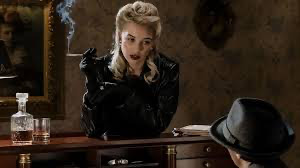
The femme fatale is usually characterized as a mysterious woman who seduces and entraps men with her body. This doesn’t necessarily have to be a gendered archetype, but often errs into sexualization and misogyny (especially in works written by men).
Examples:
Jane Smith (Mr. & Mrs. Smith)
Nikita (La Femme Nikita)
Catwoman (Batman)
Catherine Tramell (Basic Instinct)
Subversions:
1. The Femme Fatale doesn’t know they’re a femme fatale. They are a master of seduction and gaining valuable information through licentious wiles, but it’s all an accident; they just-so-happen to sleep with rivals and they just-so-happen to say important information. The femme fatale casually brings this information up in conversation, rendering the team awed by their “impressive skill set.”
2. The Femme Fatale is male or nonbinary (Bonus points if they will seduce any gender).
3. There is a Femme Fatale team; an icy power couple dedicated to killing through threesomes.
6. THE GEEK (OR MAD SCIENTIST OR NERD OR KNOW-IT-ALL ETC.)

The Geek, or the Mad Scientist, is the character known for knowing everything. They often have a lack of social skills, and their vast knowledge of random things helps the characters when they’ve been backed into a corner…though they sometimes tend to be a quick fix for writers who’ve written their characters into a corner and need an easy solution.
Examples:
Sheldon (The Big Bang Theory)
Spencer Reid (Criminal Minds)
Spock (Star Trek)
L (Death Note)
Subversions:
1. The Geek has leadership skills and ability to inspire others. Awkward is not the complete opposite of charismatic; just because someone may have trouble talking to people doesn’t mean they can’t foster intense loyalty from their comrades. (Think along the lines of L from Death Note. Bonus if they’re the leader of their organization, and their subordinates would face God and walk backwards into Hell for them).
2. Combine the Geek with another archetype, perhaps an antithesis archetype like the Dumb Jock. For example, a Geek that enjoys the outdoors and extreme sports like rock climbing (but rather than to get buff, they just want to look at the fantastic granite deposits on the side of the mountain they’re climbing). Or perhaps a Geek Femme Fatale, whose “special interest” is the psychology of seduction.
3. The Geek hates what they do. The “passion” that Geeks usually have for machines/non-humans/their chosen expertise is forced upon them because they’re super smart. In reality, they’d wanted to take it easy going to business school but nooooo the world was at stake so they had to become an expert in the intergalactic space-time continuum.
4. The Geek is useless. Their musings are more mania than genius, their explanations and ideas incomprehensible to a normal human being, and the group only keeps them around with the hopes that one day they’ll come up with an idea that actually makes sense. (Bonus if that idea comes at the climax of the story).
8. THE DUMB JOCK (OR HIMBO)
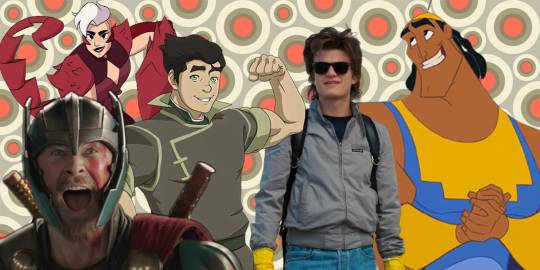
The dumb jock, also known as “the brawn,” is an archetype that is often categorized by being all buff and no brains. They often are, or at least begin as, the antagonist of the story, and if they aren’t, they’re considered the “Himbo” character (with character traits being buff, dumb, and respectful to women), who are often reduced merely to their attractiveness and stupidity, without much depth.
Examples:
Jason Carver (Stranger Things)
Mitch Downe (ParaNorman)
Kronk (The Emperor’s New Groove)
Bolin (The Legend of Korra)
Subversions:
1. The himbo and/or jock is frustrated with the way that their comrades always reduce them to the brawn. They feel left out and isolated because they can’t understand the lofty conversations of their peers, and know that they, in a way, look down on them for not being as smart (Bonus if this becomes a major plot point in the character’s arc, causing a huge blowout fight that fissures the group because of it).
2. The himbo/jock’s stupidity does not reduce them to comic relief. The himbo/jock is well-respected and has incredible emotional intelligence and charisma/street smarts, but merely lacks in textbook intelligence.
3. The himbo/jock is a woman! Break through the stereotype of dumb strong people being men and put some herbos in your story (Bonus if you don’t sexualize her and just let her be herself).
4. An idea from the jock/himbo becomes an integral part of the plan to save the world!
9. THE ANTIHERO
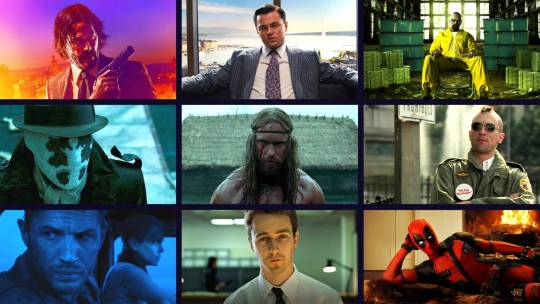
The antihero archetype is categorized by their lack of conventional heroic attributes, their execution of their goals through morally gray means, and their frequent reluctance to be the one saving the world. Their motivations may be vengeance, hatred, or any other less-than heroic inspiration besides “the greater good.” In fact, the antihero is sometimes the antagonist of the story, but due to the fact that the audience is seeing things from their perspective, they often tend to root for them.
The antihero used to be its own subversion of the “Chosen One” archetype, but became so widespread that it itself became its own archetype. That’s why antiheroes are so varied, to the point where you may not even need a subversion due to how many possible ideas there are to choose from. (This was the hardest list to make!)
Examples:
Barry Berkman (Barry)
Harley Quinn (DC)
Cassie Thomas (Promising Young Woman)
Deadpool (Deadpool)
Subversions:
1. The antihero feels guilt. Oftentimes, an antihero is depicted as stone-cold and dead-set on their actions (and sometimes they’re right! If someone killed my family, I wouldn’t care about “being the bigger person”). However, an interesting subversion may be guilt or self-awareness surrounding their actions playing a large role in the execution of their goals.
2. The antihero is not a lone wolf, and develops meaningful and positive relationships with others rather than having it be 90% snarky banter. Sometimes, antiheroes suffer from a lack of three-dimensionality due to most of their dialogue being cheeky one-liners. Anchor them solidly into the story by building a web of relationships to support them! (They don’t have to all be lovey-dovey, either! Even enemy relationships can be more than snark).
3. An honor code. Giving an antihero with an interesting honor code regarding killing, stealing, or any of their other morally gray deeds could be an excellent subversion! Having characters who are stone-cold killers but draw the line (perhaps in an odd way, such as refusing to steal cars or kill pets), somewhere can be a great way to develop their personality and show the readers their motivations.
Hope these all helped, and happy writing!
#writing#writers#writeblr#booklr#writing tips#writing advice#writing help#creative writing#characters#character tropes
585 notes
·
View notes
Text

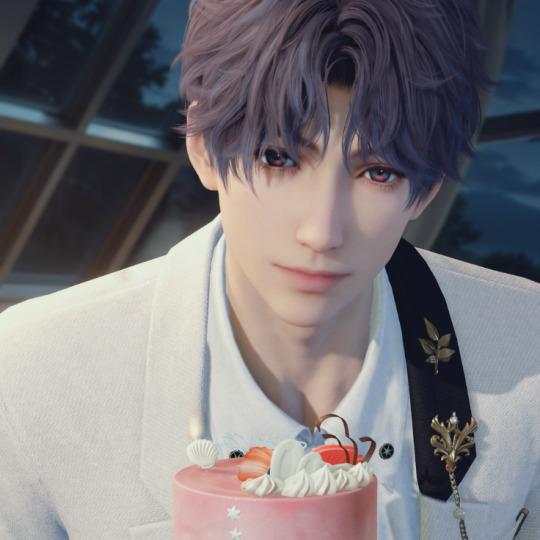

Where The Ocean Whispers
Happy Rafayel's Day!
𓇼— The Lemurians use special seashells to transmit messages from their heart to one another. Would you like to try?
𓇼— Soft fluff, birthday fluff, confession
𓇼— Masterlist
𓇼— Request a fic

The waves brought layers of white foam to the shore, erasing the intertwined footprints, sand arches and tiny seashells covering two pairs of bare feet almost touching each other. Then, as if to wash away every worry, the cold water faded, leaving behind nothing except a sense of calm and coolness, with a sense of longing for the next wave. The crimson sun glistened well below the horizon, akin to a priceless ruby gradually sinking to the ocean floor.
"Look over there. The sea is swallowing your sun!”
A long finger of his gestured forward. Your gaze followed as you smiled. He was still reminded of the narrative you told about your childhood when you thought that every night, the sun would sink into the sea and rest.
“Now the whole ocean will be warmed, in red and orange, right?” You replied. That was what he said after hearing your story. He seemed so happy and content that you could still remember it and recite every word.
“Maybe we can't paint the sea the color of the sun,” your voice continued, “But we can do this…”
All of a sudden, you hurled water high with your foot. The cool water reached him, splashing a bit on his white shirt. He rolled his eyes at you.
“So you do enjoy being playful like this?”
He bent down, gathered the entire ocean in his hands then flung it in your direction. Like a very gentle wave, seawater fell on your hair and light garment.
After the celebration was over, he and you raced outside to catch the sunset over the sea, leaving your coats and shoes behind. Both of you were drenched.
"That's not fair!" You gave a loud shout. “Did you do that on purpose?”
With a big chuckle, he answered, "That's what we refer to as the blessing of the sea." You have to accept it all.”
“You are the birthday boy. Here, take it all!”
You kept splashing him with saltwater. He persisted nonetheless. Before long, your entire bodies was soaked.
“That's enough, Rafayel. I give up!”
You surrendered by raising both hands. You felt a bit chilled by the breeze. Rafayel hauled you right up to the shore. You had no idea when he had a big towel ready there. He wrapped it around you.
“Hurry. Dry yourself.”
You obediently did as told. Then you gave him another glance. Water dripped from his dark purple curls, framing his small, flawless face. You couldn't take your eyes off the damp shirt that adhered to his body, exposing lines that made you flush. Rafayel took one look at you and immediately covered himself with both hands.
“I'm aware that my beauty can stun others. But if you keep staring at me like that, it would not be proper anymore."
You hid your embarrassed face behind the cotton towel. With a smile, Rafayel enquired:
"So? Do you want to go back inside?”
You gave him a firm shake of your head. “I want to stay here a little longer.”
Not that Rafayel objected. He accompanied you on your beach stroll. You remained quiet. You did not want to go back partly because you could not bear to see the day ended.
It was Rafayel's birthday. You had carefully prepared for an intimate party, with only a few people from his studio and family members attending. You personally made the cake for him and prepared everything yourself. But your heart was still restless as you kept carrying the feeling that this was not enough. You had yet to give him what he truly needed.
You continued to ponder. Rafayel needed what? He was wealthy and famous. He was exceptionally gifted, and he may have lived an extended lifespan. Giving something to someone who has had everything is impossible. If you could give him your heart, you would do so. In a symbolic sense.
Between you and Rafayel was a feeling without a name.
You started off as merely his reluctant bodyguard, someone to take care of his errands. You were not sure when exactly, but the image of him planted roots in your mind like the way he frequently appeared in front of you, provoking you. He was adorable and obnoxious all at once. Although he posed a threat, being around him gave you a sense of security. But you never, ever dared to speak it aloud. Perhaps you were afraid. You feared that the relationship would fizzle out like sea foam the moment you began seeking to give it a name. You made an effort to suppress that emotion, but it kept returning, much like waves finding their way back to the shore.
"What's off?" Rafayel enquired. He came to a stop. His expression was undoubtedly showing concern.
"I'm alright." You dismissed him with a shake of your head. Your heart raced whenever you were close to him. The feeling of being on cloud nine, at the same time realizing that a bottomless black hole was waiting at your feet made you about to lose your mind. You hated this feeling, yet also addicted to it. Like the way you were addicted to his very existence. Perfect like a dream.
His cool hand was placed on your forehead. He frowned and said:
“It seems your temperature is a bit high.”
You retreated a step, rejecting his touch. It was as if there was poison from his body that would seep into your heart, and you would drive yourself to a slow death if you could not touch him again.
“I'm fine.” With a resolute reply, you took a seat on the sand, a little wet from the waves. “I'm just a little tired… Let me sit here for a bit…”
Rafayel looked at you with a puzzled expression. He was curious to know what else you were planning to do. But you hid your face in the white towel. He sighed.
"I'll go fetch you some exquisite seashells then. Maybe it will make you feel better.”
You gave a little nod, glancing at Rafayel's back as it absorbed the last bit of sunlight on a peaceful day. This scene was a bit familiar, like the first time you had by chance met him on the street.
Rafayel knelt to get something that the waves had just carried. He held it tenderly in his palm, studied it for a moment, and then came over to you.
“Look what I've just found.” A fairly large shell weaved together in shades of orange-red and ivory-white was what he held out in front of you. You had never seen a shell with such a special hue like this before.
"So beautiful!" You exclaimed as Rafayel plopped down next to you on the sand. Your heart raced again as he sat so near.
“You know, the Lemurians often use shells like this to transmit messages to each other.”
He twisted it in his hand to examine it more closely before placing it in your palm.
“Do you want to give it a shot?”
You raised the shell quite a bit. Its hue was nearly identical to that of the horizon's sunset. You said:
“Show me how to do it.”
“Just tell the seashell what you want to say the most right now.”
“Is that all?”
“Yup. That's all. But what you say to it must come from the heart. It will find the person whom you want to send this to, no matter where they are.”
You looked at Rafayel. He appeared so honest, but this story was too much of a fairy tale and not very realistic. You did not know if he was just making this up to tease you. Then again, you once thought the Lemurians never existed. But here he was, sitting next to you.
You put the seashell to your lips, gave him another glance, and then murmured something to it.
Once you were done, you gave it to Rafayel.
“It's yours.”
His lips curled into a dazzling smile, as though he knew you would give it back to him.
“Hmmm.” Rafayel took the shell and leaned it close to his ear. He gestured as if he was concentrating hard to listen. Then he said with disappointment evident on his face: “I don't hear any message.”
"What? How is that possible?" You were impatient.
“Do you want to try again?”
He returned the shell to your hand. This time, you took a deep breath and looked at him while whispering your thoughts.
“Still nothing.” After listening to it for a second time, Rafayel said. “Are you sure you sent the message with all your heart?”
You replied sullenly: "Of course... Maybe since I'm not a Lemurian, I can't make it work."
Rafayel held your hand and put the shell in it. “Try it once more?”
"I doubt that anything will be different this time around." You gazed at the shell in your hand with boredom. “I was just going to… give you one more gift to make your birthday special…”
“My day is already quite special.” Rafayel's bright smile made the distant sunset dim, and suddenly you caught his warmth. “Thank you so much, for organizing a party for me. To be honest, though, I don't like partying as much as going to the sea with you like this."
Listening to his words, you found yourself smiling. You took off the towel that was wrapped around you, letting it fall freely onto the sand. You held the brilliant seashell in your hands, this time determined to let him hear your heart out.
Rafayel nodded and smiled at you as encouragement. You closed your eyes tightly, and lips slightly parted. You had a feeling that it could read my thoughts whether you said them out loud or not.
I really like, really like, really like Rafayel.
I like the way you concentrate when holding a paintbrush, as if the whole world is spread out before your eyes.
I like your terrified look when surrounded by cats.
I like it when you overdo things or act like a drama queen just to get my attention.
I like the bright colors you paint in my sky when it's gray.
I like the way you tease and then comfort me.
I like how your gentle touches are enough to keep me up at night.
I like everything about you.
Maybe, I love you, Rafayel. So much.
The shell was brought towards Rafayel, but halted midway. You wavered. Once he knew your feelings, would he still be by your side? Or would he throw this shell into the ocean along with your heart, letting it dissolve into bubbly white foam?
Rafayel looked at you and smiled. Even though he had laughed many times, you'd never seen him as happy as he was at that moment. There was an increased shine in his eyes, as if pearls were rising to the surface and ready to burst out the corners of his eyes. Happiness. You had never captured such a genuine moment of pure happiness like this.
He took the shell from your hand, but there was no need to listen to it anymore. He leaned closer to you and whispered:
“The words from your heart have been received by the person you wanted to send them to… You have no idea how long he waited just to hear those words… I love you too. So much."
When you felt soft lips touching yours, little did you know; that Lemurian man had heard what you said the first time he put his ear to the shell. He merely wanted to hear it one more time, and another. He wanted to hear you confess being able to confess to you; this day, the day after, and the day after that...
Until the ocean runs dry.

#rafayel's birthday#fanfic#fanfiction#love and deepspace#heart hunters series#moments with rafayel#rafayel x mc#rafayel x f!reader#rafayel x reader#rafayel x you#love and deepspace fanfic#dividers by cafekitsune;#divider by saradika;#lnd#l&d#lad#qi yu#homura#qi yu x reader#homura x reader#love and deepspace rafayel#lad rafayel#lad x reader#lads x reader
270 notes
·
View notes
Text
-> declan bringing ashley to monmouth. ashley, the raven boys, chapter 4. (we’re meant to look pretty for her.)
this is one of the first chapters where we really get to know a lot about our characters, and ashley being there—combined with adam suddenly being aware that they are observed when it’s clear he didn’t feel that way immediately preceding the start of the book—lead me to believe that the fourth wall is very thin here.
-> ashley, this is noah, can you see him?
ashley is one of the only characters outside of the gangsey themselves who is not only able to see noah but also to meet and interact with him.
-> (your hands are cold. (i’ve been dead for seven years.))
ashley is also the first person that noah says this to within the confines of the narrative himself. nobody is surprised when he says this, so clearly he does make these jokes a lot, but it’s significant that we, the reader, hear this for the first time when it’s directed at ashley—ashley who, like us, just got here and doesn’t (can’t) know the significance of this interaction until after everything is over.
-> adam. (don’t you feel observed? someone is looking in when they weren’t before.) the raven boys, chapter 4.
adam: wary, adam: watchful. adam feels the eyes of the reader when the others do not; adam becomes aware of us as soon as we become aware of him. no sooner is ashley named than adam is introduced; no sooner is ashley introduced than adam is wary of her.
ashley (f, gaelic: aislinn): dream, vision
-> (three ashleys) (three brothers) (three witches) (nine’s very three plus three plus three) (6:21) (3+3:+3)
-> declan started hating me first. it was all because declan loved ronan.

-> this is not the first time

declan lynch was 18 the first time matthew fell asleep (was ronan dead)
-> gansey. where’s ronan? i don’t know. something’s wrong. something’s happened to him. how do you know? i can’t explain. i don’t know. we fought. something’s wrong
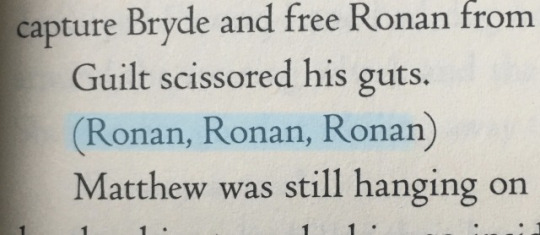
he’s your dog, gansey (i can’t help him any more (i’m killing him and i don’t know how to stop))
-> he trusted gansey (he still worried about ronan (he never stopped worrying about ronan))
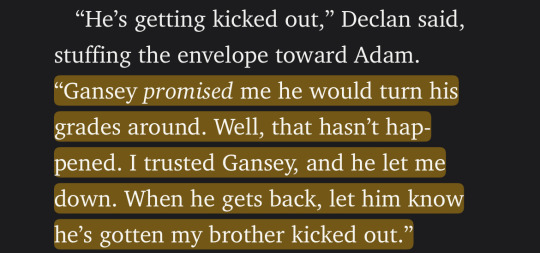
i want you to meet ashley. yes again it’s a different ashley (i need to check in with you) is ronan around? he shouldn’t be (we’ll fight if he’s there (i need to know how he’s doing (he’ll hate me more for hovering)))
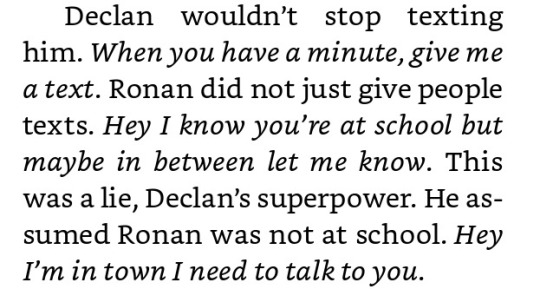
-> ronan please just tell me it won’t happen again i’m doing everything i can to keep you both alive
the brothers lynch (a dreamer (a dream (declan)))

-> half none of declan’s surviving family was real. half a dreamer. half a dream. to lose one is to lose the other (part of ronan died when niall did (part of ronan died when his dreamer did))
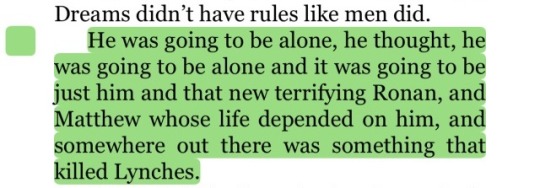
ronan lynch was 18 when a demon nearly unmade him (the second time matthew fell asleep (the second time declan almost lost them both at once (was ronan dead)))

-> declan cannot let go (if he lets go who will hang on (who will live without him fighting tooth and nail to keep them))
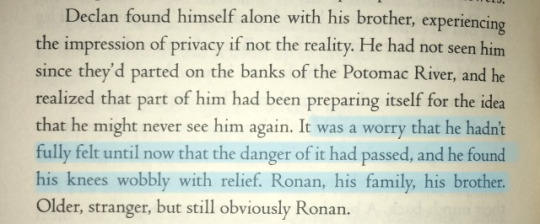
matthew lynch was 18 when he punched his eldest brother in the face (matthew lynch was 18 the third time declan almost became the last living lynch)
-> was ronan dead
declan bringing ashley to monmouth. ashley, the raven boys, chapter 4. ashley (f, gaelic: aislinn): dream, vision. three ashleys. three brothers. three dreamers. three sleepers. three witches. three murders. nine’s very three plus three plus three
(i look just like my father (so do you (every time i see your blood on my knuckles i remember him dead in the driveway (every time i look at you i see the face of a dead man))))
-> was ronan dead

declan brings ashley to monmouth.
#hi guys. this is not coherent i know. sorry. here’s the ashley-declan-ronan post nobody asked for#the raven cycle#declan lynch#ronan lynch#matthew lynch#the lynch brothers#helenaposting#barbi.trc#trc meta#trc quotes#best of
210 notes
·
View notes